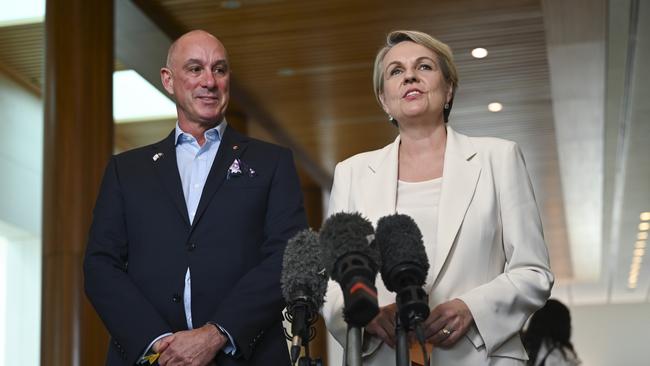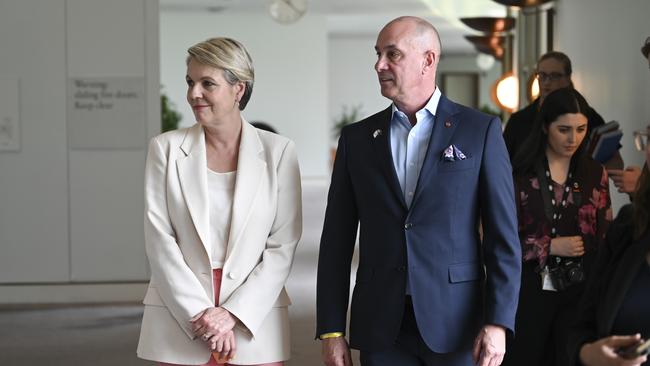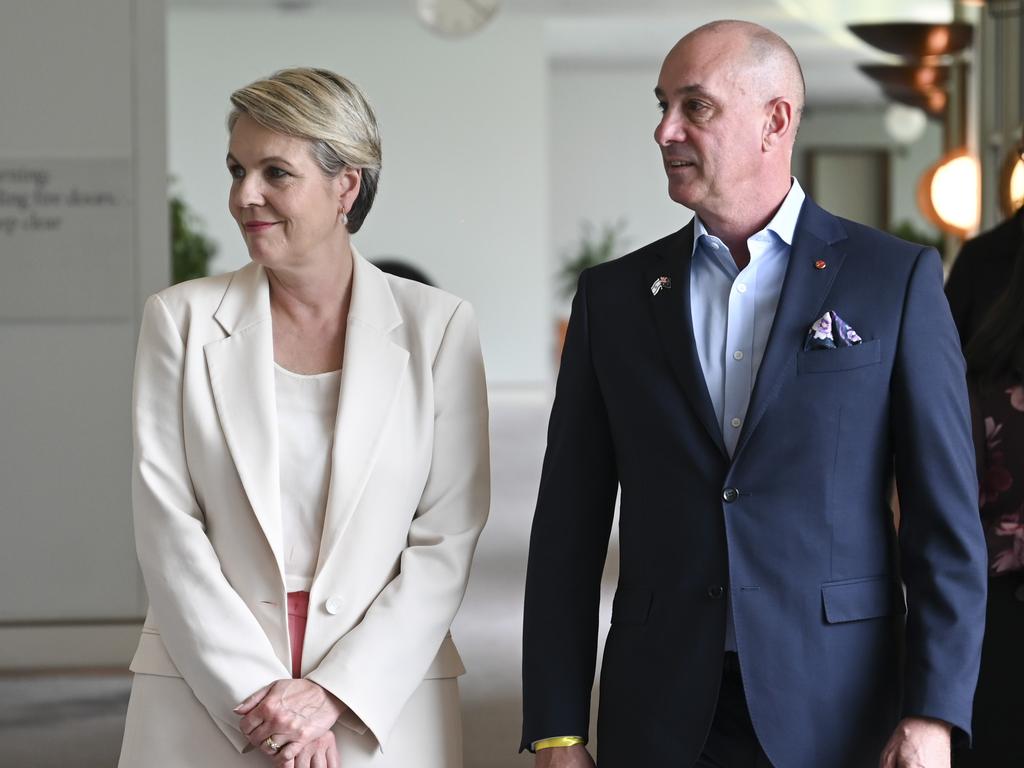David Van emerges as potential industrial relations kingmaker
David Van – who quit the Liberal Party over allegations of sexual harassment – has emerged as a potential kingmaker vote on Labor’s IR legislation.
Crossbench senator David Van – who quit the Liberal Party over allegations of sexual harassment – has emerged as a potential kingmaker vote on Labor’s industrial relations legislation after declaring he was open to talks with Tony Burke and union leaders.
After successfully negotiating a legislative deal with Environment Minister Tanya Plibersek on the Murray-Darling Basin on Tuesday, the Liberal defector told The Australian: “I think people are only just starting to figure out that as an independent, my vote has some weight now.”
The Australian understands Workplace Relations Minister Mr Burke and union leaders are open to talking with Senator Van, despite senior Labor MPs condemning the 59-year-old in June over sexual harassment allegations referred by Peter Dutton to the Parliamentary Workplace Support Service.
Asked about the investigation into allegations made by Greens senator Lidia Thorpe, an unnamed former Liberal MP and former Liberal minister Amanda Stoker, who claimed he groped her on the bottom, Senator Van said “it’s an ongoing and confidential process … I’m not going to talk about that at all”.
With crossbench senators Jacqui Lambie and David Pocock holding out support for Mr Burke’s IR shake-up, which sparked strong pushback among teal independents on Tuesday, Senator Van could provide a legislative path for the government.
After winning amendments from Ms Plibersek on Labor’s Restoring Our Rivers Bill, Senator Van said “there’s bits of the Closing Loopholes bill that I think are right”.
“I’ve asked for a rotating door to be put on my office because everyone is coming to talk to me and that’s unions, business and employer groups. It’s a broad range of stakeholders. That’s my job to listen to stakeholders and see what’s going to be best for Australia,” he said.
“I am an independent. I deliberately resigned from the Liberal Party because I cannot be part of a party that doesn’t stand for what I believe in anymore.
“While I didn’t like the price I had to pay to become an independent, I’m very much enjoying being one.”
Senator Van said he had “some major concerns with the bill but there are also bits that I very much support, such as stopping wage theft … that is something we can all agree should happen”.
While expressing concerns around union-access clauses that “go a little bit too far”, he said he was open to talks with Mr Burke.
The Victorian independent supported the Lambie-Pocock private member’s bills that carved out four key elements of the IR bill.
Business and crossbench sources had recently raised the prospect that Senator Van could broker a deal with the government on industrial relations. While most industry chiefs believed he would not, despite bad blood with the Coalition, some described him as a “wildcard”.
Unions have asked Senator Van for a meeting but he is yet to hold talks with any union representatives.

ACTU secretary Sally McManus said “unions will continue to advocate the need for working people to have stronger workplace rights to help with the cost of living with all members of the crossbench”.
Employer groups, intent on getting the bill defeated, attacked new amendments tabled in parliament by Mr Burke on Tuesday in relation to proposed labour hire, casual and gig work provisions, claiming they failed to address their concerns and, in some ways, “made a bad bill worse”.
After teal MPs called for the bill’s passage through the lower house to be delayed until next year, Mr Burke said he wanted them passed by Wednesday as he believed Coalition senators would exploit any hold up this week to further delay the bill in the Senate.
Business organisations said amendments to labour hire provisions extended their reach to joint ventures and allowed unions to rope multiple employers into one Fair Work Commission application rather than require separate applications.
“Any concessions businesses received from the government are crumbs compared to the giant cake plonked on the union table,” Minerals Council of Australia chief executive Tania Constable said.
The MCA, which is spending up to $24m to try to kill the bill, sent out texts to 760,000 voters in 20 marginal seats on Tuesday claiming the “deeply flawed” changes were about to “make your cost of living worse”.
Business Council of Australia chief executive Bran Black backed crossbench calls for passage of the amendments to be delayed: “This legislation is some of the most complex workplace relations change we’ve seen in many years and it deserves proper scrutiny and debate”.
Mr Burke hit back at the MCA and BCA on Tuesday night, saying there would be no amendments that would ever be acceptable to them “for the simple reason they have members who currently use the loopholes”.
“BHP in the case of the Minerals Council and both BHP and Qantas for the Business Council. They’re being funded to run a multimillion-dollar campaign against this legislation,” he told the parliament.
“The ads will misrepresent what the legislation does and at no point will they defend the loopholes that certain employers want to keep open.”
Labor agreed to further amendments to the bill to lock in support from the Greens, including criminalising superannuation theft, preventing companies using new arbitration powers to cut hard-won conditions of workers and changes relating to definitions around casual work for teachers.
The Greens will support the bill’s passage in the House of Representatives but reserved its position in the Senate as it pushes for changes, including the right of workers to ignore phone calls and emails from bosses after hours.
The minor party and Senator Thorpe are expected to back the bill when it comes to a Senate vote from February next year, meaning the government is likely to need a single crossbench vote to get it passed.

Australian Resources and Energy Employer Association chief executive Steve Knott said the amendments confirmed service contractors would be exempt from the labour hire proposals, a statement rejected by Ms Constable.
He expressed concerns at the apparent expansion of the commission’s jurisdiction to consider joint ventures and “common enterprises”, as well as to effectively make “multi-employer” orders capturing a number of employers supplying labour to a host business via one application.
Senator Lambie and Senator Pocock on Tuesday sought again to secure passage of four uncontroversial elements of the bill by successfully moving a Senate motion requesting a “conference” between the two houses. They said conferences between the Senate and the House of Representatives were a means of seeking agreement on a bill when the usual procedure of exchanging messages fails.
The last time this was attempted was 1950. The government used its numbers to reject an opposition push to have the motion debated immediately.
ADDITIONAL REPORTING: SARAH ISON






